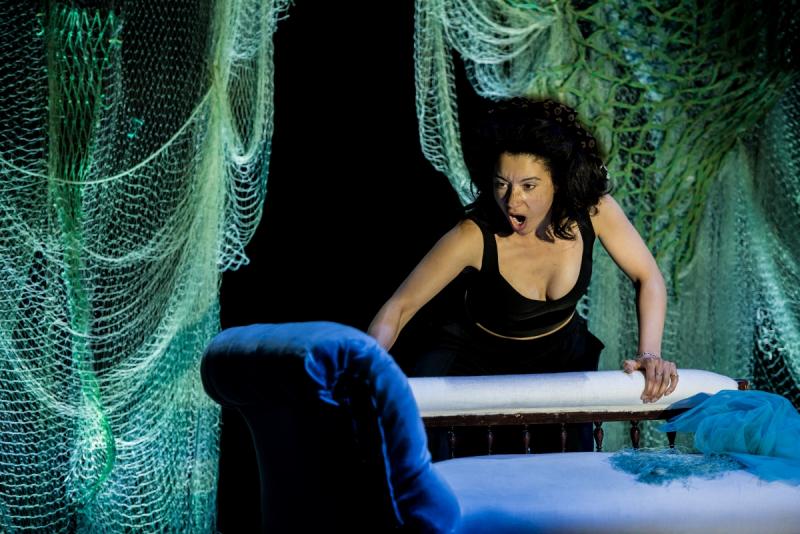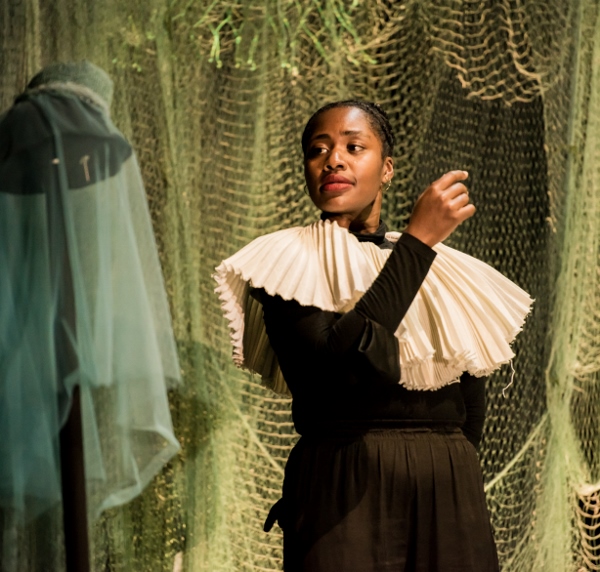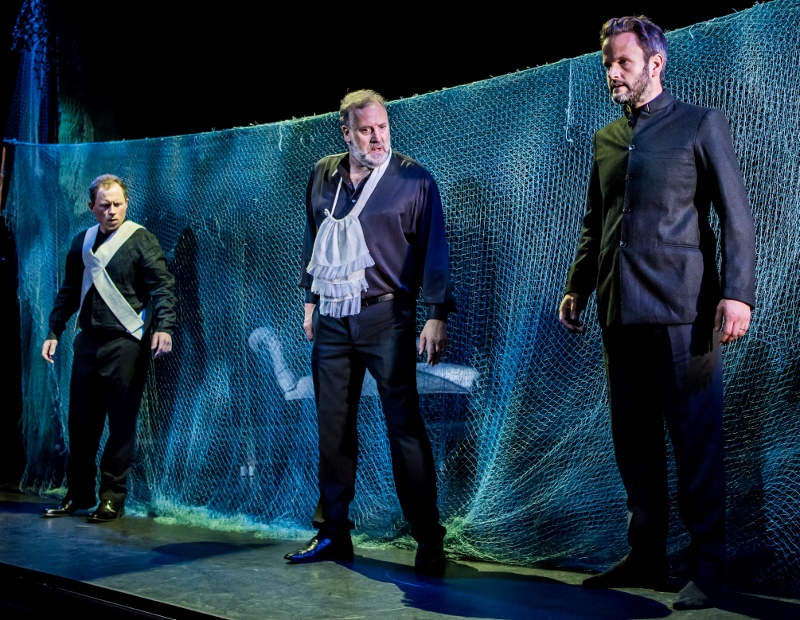Dido’s Ghost, Buxton International Festival review - the Queen of Carthage returns | reviews, news & interviews
Dido’s Ghost, Buxton International Festival review - the Queen of Carthage returns
Dido’s Ghost, Buxton International Festival review - the Queen of Carthage returns
Errollyn Wallen’s take on Purcell brilliantly splices rock and baroque

“Remember me!”, sang Dido to a departed Aeneas in the heart-rending aria-chaconne announcing her demise that dominates the ending of Purcell’s baroque opera. But what if he did … if in fact he never could forget her?
Performed by the Dunedin Consort, under John Butt, in a production by Frederic Wake-Walker, it premiered at the Barbican last month and has now moved on to Buxton International Festival before transfer to elsewhere including the Edinburgh Festival. The storyline itself (libretto by Wesley Stace, aka John Wesley Harding) is derived from clas sical myth, just like Nahum Tate’s text for Dido and Aeneas, but takes us further on, to the time when Aeneas has become king of the New Troy on Italian soil, and has married Lavinia. Dido’s sister Anna is washed up on his shores after a storm, and to him she’s like a reincarnation of the Dido he loved and lost.
 Lavinia is not so impressed and gets so carried away that she has the Purcell work performed (as a “masque”) at court, with the Belinda (Nardus Williams pictured right) as Spirit of the Theatre asking Anna to join in as Dido, and Aeneas as himself. Aided and abetted by her spy, Elymas (who becomes the Sorcerer), Lavinia takes on the baleful role of the Spirit who tells Aeneas to dump Dido. The next bit of the Tate original is dropped, but we see Ascanius, Aeneas’s son, as the solo sailor, and once we realise that the “witches” and Lavinia are singing “Destruction’s our delight” about what they propose to do to Anna, there’s more of Wallen than Purcell in the ensuing splice.
Lavinia is not so impressed and gets so carried away that she has the Purcell work performed (as a “masque”) at court, with the Belinda (Nardus Williams pictured right) as Spirit of the Theatre asking Anna to join in as Dido, and Aeneas as himself. Aided and abetted by her spy, Elymas (who becomes the Sorcerer), Lavinia takes on the baleful role of the Spirit who tells Aeneas to dump Dido. The next bit of the Tate original is dropped, but we see Ascanius, Aeneas’s son, as the solo sailor, and once we realise that the “witches” and Lavinia are singing “Destruction’s our delight” about what they propose to do to Anna, there’s more of Wallen than Purcell in the ensuing splice.
The composer brilliantly intertwines her own music with Purcell’s and uses references to it, too: her witches’ dance has a short, pounding bass guitar riff like a chaconne in itself (a big number, almost in rock style, this one) as Anna is woken from Lavinia’s spell. Aeneas sees Anna (or is it Dido?) and the accompaniment starts the Lament, but he is its singer, and she adds a counter-melody (another wonderful invention).
Wallen builds tension with assured skill as Anna escapes, but Belinda tells Aeneas that she’s “hidden for ever in the healing waters”: cue more keening cries of “Remember me” and “Remember this” from the parted lovers. The Lament finally emerges in full from Aeneas’s lips as he prepares to end it all, and the chorus sing Purcell’s finale (with a little postlude from Wallen).
It sounds like a mish-mash, and it's certainly complicated, but so ingenious and clearly presented on the stage that the re-working of the plot line and the combination of Purcell and Wallen seem to flow effortlessly in theatrical terms. There are many more hints and references from Wallen and Stace to the Tate-Purcell text (such as using “When monarchs unite” as text for part of the Wallen Act One), and the textures of the present-day instrumentation mixed with baroque sounds are themselves a fascination: bass-based, triad-led and melodically contrapuntal, as baroque music is, but thoroughly modern in rhythmic energy and dramatic in impact.
The other powerful aspect of the show is the sheer quality of the performances. On the first night at Buxton, Isabelle Peters stepped up from the chorus to take the role of Anna/Dido, in place of the unwell Idunnu Münch. Peters, a WNO associate artist, was an outstanding Dorabella in a Royal Northern College of Music production of Cosí fan Tutte in 2016 and for those in Manchester had made an impression as Rapunzel in the Royal Exchange Theatre’s Into The Woods shortly before. She is a gifted actress as well as an excellent singer, and unhesitatingly carried all the dimensions of the part on this occasion. Jessica Gillingwater brought incisive vocal strength and presence to the role of Lavinia, and Nardus Williams found an individual characterization of charm in Belinda, along with that richness of timbre that’s already impressed UK opera and concert audiences widely.  Add to those the two witches’ performances from Lucy Goddard and Judy Brown of the Dunedin Consort ranks, and you have an exceptionally strong female line-up for John Butt to direct. Matthew Brooks’ Aeneas likewise sang strongly and with emotional awareness throughout, and Timothy Dickinson (Elymas) and Dunedin’s David Lee (Ascanius) were no less committed (the three pictured above).
Add to those the two witches’ performances from Lucy Goddard and Judy Brown of the Dunedin Consort ranks, and you have an exceptionally strong female line-up for John Butt to direct. Matthew Brooks’ Aeneas likewise sang strongly and with emotional awareness throughout, and Timothy Dickinson (Elymas) and Dunedin’s David Lee (Ascanius) were no less committed (the three pictured above).
Wake-Walker’s production has the chorus on stage but taking part in the action even from their chairs (they turn away in horror as Aeneas is drawn to his fatal his doom by the Spirit=Lavinia), and the simple (no doubt budget-restricted) design by Anna Jones serves the story well.
It’s a stimulating piece of creation and adaptation, done to a very high standard indeed, and may even be remembered as one of the most striking and original artistic products of the Covid era.
The Buxton opera programme has also delivered Pauline Viardot’s salon-entertainment-with-piano version of Cendrillon, a charming piece of sentimental whimsy written by the great mezzo when in her 80s in the early 20th century, performed by the gifted “Young Artists” (mainly from Manchester’s Royal Northern College of Music) of Buxton International Festival, and the Early Opera Company’s production of Handel’s Acis and Galatea – sung and played outstandingly beautifully in a production that, not entirely successfully, attempts to transfer the action to an academic symposium in the 1960s.
rating
Explore topics
Share this article
The future of Arts Journalism
You can stop theartsdesk.com closing!
We urgently need financing to survive. Our fundraising drive has thus far raised £49,000 but we need to reach £100,000 or we will be forced to close. Please contribute here: https://gofund.me/c3f6033d
And if you can forward this information to anyone who might assist, we’d be grateful.

Subscribe to theartsdesk.com
Thank you for continuing to read our work on theartsdesk.com. For unlimited access to every article in its entirety, including our archive of more than 15,000 pieces, we're asking for £5 per month or £40 per year. We feel it's a very good deal, and hope you do too.
To take a subscription now simply click here.
And if you're looking for that extra gift for a friend or family member, why not treat them to a theartsdesk.com gift subscription?
more Opera
 Albert Herring, English National Opera review - a great comedy with depths fully realised
Britten’s delight was never made for the Coliseum, but it works on its first outing there
Albert Herring, English National Opera review - a great comedy with depths fully realised
Britten’s delight was never made for the Coliseum, but it works on its first outing there
 Carmen, English National Opera review - not quite dangerous
Hopes for Niamh O’Sullivan only partly fulfilled, though much good singing throughout
Carmen, English National Opera review - not quite dangerous
Hopes for Niamh O’Sullivan only partly fulfilled, though much good singing throughout
 Giustino, Linbury Theatre review - a stylish account of a slight opera
Gods, mortals and monsters do battle in Handel's charming drama
Giustino, Linbury Theatre review - a stylish account of a slight opera
Gods, mortals and monsters do battle in Handel's charming drama
 Susanna, Opera North review - hybrid staging of a Handel oratorio
Dance and signing complement outstanding singing in a story of virtue rewarded
Susanna, Opera North review - hybrid staging of a Handel oratorio
Dance and signing complement outstanding singing in a story of virtue rewarded
 Ariodante, Opéra Garnier, Paris review - a blast of Baroque beauty
A near-perfect night at the opera
Ariodante, Opéra Garnier, Paris review - a blast of Baroque beauty
A near-perfect night at the opera
 Cinderella/La Cenerentola, English National Opera review - the truth behind the tinsel
Appealing performances cut through hyperactive stagecraft
Cinderella/La Cenerentola, English National Opera review - the truth behind the tinsel
Appealing performances cut through hyperactive stagecraft
 Tosca, Royal Opera review - Ailyn Pérez steps in as the most vivid of divas
Jakub Hrůša’s multicoloured Puccini last night found a soprano to match
Tosca, Royal Opera review - Ailyn Pérez steps in as the most vivid of divas
Jakub Hrůša’s multicoloured Puccini last night found a soprano to match
 Tosca, Welsh National Opera review - a great company reduced to brilliance
The old warhorse made special by the basics
Tosca, Welsh National Opera review - a great company reduced to brilliance
The old warhorse made special by the basics
 BBC Proms: The Marriage of Figaro, Glyndebourne Festival review - merriment and menace
Strong Proms transfer for a robust and affecting show
BBC Proms: The Marriage of Figaro, Glyndebourne Festival review - merriment and menace
Strong Proms transfer for a robust and affecting show
 BBC Proms: Suor Angelica, LSO, Pappano review - earthly passion, heavenly grief
A Sister to remember blesses Puccini's convent tragedy
BBC Proms: Suor Angelica, LSO, Pappano review - earthly passion, heavenly grief
A Sister to remember blesses Puccini's convent tragedy
 Orpheus and Eurydice, Opera Queensland/SCO, Edinburgh International Festival 2025 review - dazzling, but distracting
Eye-popping acrobatics don’t always assist in Gluck’s quest for operatic truth
Orpheus and Eurydice, Opera Queensland/SCO, Edinburgh International Festival 2025 review - dazzling, but distracting
Eye-popping acrobatics don’t always assist in Gluck’s quest for operatic truth
 MARS, Irish National Opera review - silly space oddity with fun stretches
Cast, orchestra and production give Jennifer Walshe’s bold collage their all
MARS, Irish National Opera review - silly space oddity with fun stretches
Cast, orchestra and production give Jennifer Walshe’s bold collage their all

Add comment